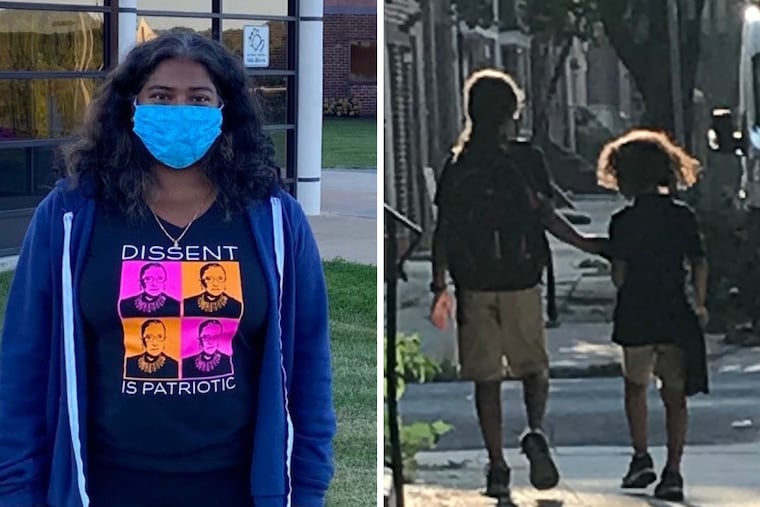What I want to tell my kids about racism as a South Asian American mom | Opinion
I have struggled with how to have honest and clear discussions with my children about the racial unrest around us.

Parents have done the impossible this year, holding our families together throughout a pandemic.
Amid the turmoil, division, and tensions around us, parents shoulder the responsibility of filtering the overwhelming emotions of our world into an age-appropriate, PG version for our children – to protect their emotional wellness while also trying to expose them to our reality and the lessons that could follow. How do we explain the latest rounds of mass shootings to our kids, even when the news cycle moves on and forgets? How can we convey the tremendous loss of life and potential that stems from racially driven hatred as we saw in Atlanta? What are the lessons we can teach amid our own heartache and confusion?
Months ago, I watched in shock footage of a woman tackling a boy my own son’s age with false conviction that he had stolen her cell phone. The woman’s appalling behavior was not what left me speechless. I was and remain astounded by the herculean restraint of the child’s father, Black jazz trumpeter Keyon Harrold. Undoubtedly, if I saw an adult put their hands on my child, the Hulk-Mama-Bear within would come out to protect my son. I realized this father may have had to spend his whole life confronting the reality that in our society, restraint could be his most important survival skill – and the most critical to pass on to his children.
» READ MORE: My childhood was so tinged with racism I couldn’t even recognize it | Opinion
I have struggled with how to have honest and clear discussions with my children about the racial unrest around us. I am a woman of color, the daughter of immigrants, and an Asian American, specifically South Asian American. My children are the next generation. I know well that my own privilege, including having the opportunities to pursue advanced degrees that shape perceptions of me, has sheltered me from some of the harshest realities of racist hate. I have nonetheless experienced racism and racial bias, ranging from microaggressions to physical threats, including being overlooked entirely — viewed as hard to place, neither the majority nor the minority. As a brown woman who is neither soft-spoken nor generally passive, I don’t fit archaic stereotypes of Asian women, although I have been lumped into the model minority and the perpetual foreigner buckets.
When faced with race-based aggressions, I would remain silent, drop my eyes, and tell myself it was not worth a confrontation or even a response. I was an adult before I recognized I had experienced racist subjugation. It took a friend to explain colorism, and how I too had come out on the “wrong” side of the brown paper bag test. The trauma and fear that followed came from how unprepared I was for the reality that my efforts and skills could be impacted by the personal traits with which I was born.
Americans have seen how East Asians in particular are being targeted right now, as if they are personally responsible for the effects of a pandemic. South Asians in America might remember the specific targeting we went through after 9/11, when some readily associated brown skin with terrorism. Our communities have taken daily hits in different ways and largely accepted this as part of life as Asian Americans.
“I don’t pretend to have all the answers for how I should parent through this moment. But I have seen how ignoring and allowing even minor acts of racism allows it to fester and grow.”
I don’t pretend to have all the answers for how I should parent through this moment. But I have seen how ignoring and allowing even minor acts of racism allows it to fester and grow, where microaggressions can eventually become blatant harm. As a mother, I want to raise my kids to be aware and confident, but also to protect themselves and those around them. Here are my words to them:
You are American. People may question that or act as if you have to prove it, but you need not. You have the great fortune of knowing who your ancestors were and where you came from. But this is your nation and you embody all of its greatest virtues.
» READ MORE: The ‘model minority’ stereotype simplifies Asian American stories like mine | Opinion
When you have to check the boxes on forms, you will look for the one that best describes who you are, knowing that it’s imperfect. The box in which you fall – Asian – reflects peoples who make up 60% of the global population and nearly 50 countries. You may be very different from many others who also check this box, but as an American of Asian descent, this box will be yours together.
I can’t explain the deep hurt and confusion that come from being made to feel like an outsider when you belong in every way. I can only hope that you learn from it. You shouldn’t be silent when faced with racist behaviors, but you must always act with respect and honor - befitting the family and community who came before you. You are not alone -- nor in competition with others who also deal with boxes to check or classifications that don’t fit.
Each of us must advocate for and protect ourselves. For anything to change, we must advocate for and protect others — not just our children but our neighbors, and for the generations coming after us. These are the best values of this country — and we are American.
Priya Mammen is an emergency physician, a fellow of the Lindy Institute of Urban Innovation at Drexel University, and an adjunct faculty member at the University of Pennsylvania.